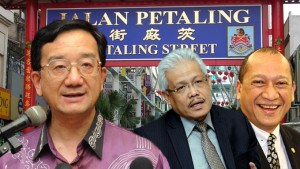Malaysia summons China’s ambassador. But did it really?

Did anyone honestly expect the ambassador to apologise or retract his remarks?
Tan Jooi Long, The Ant Daily
What happens during a diplomatic summons? In short, a country’s ambassador gets an earful from a foreign ministry, in a kind of high-level, public show of disapproval.
But when Malaysia summoned Chinese ambassador Huang Huikang less than 72 hours after his controversial visit to Chinatown, it was more contradictory than diplomatic.
Global media widely reported the envoy’s visit to Petaling Street on the eve of the abortive “red shirt” rally.
A widely-regarded regional portal headlined its story thus: China’s ambassador tells Malaysia to stop the racism.
To all intents and purposes, Huang’s visit but more so his blunt remarks to the media seemed an unwarranted interference in Malaysia’s domestic affairs.
More seriously, it was obviously an unprecedented breach of a solemn undertaking given by China to Malaysia when the two countries established diplomatic relations in 1974.
So what gives?
When red shirt leader Jamal Yunos screamed “Cina Babi”, he literally painted the entire Chinese race as just that: “All Chinese are pigs”.
So when the Chinese ambassador spoke to the media throng during last Friday’s walkabout in Petaling Street, his words were as clear as daylight.
On the surface, Huang made his statement in defence of Chinese people.
But was he actually defending Chinese Malaysians whom Jamal and his ilk actually disparaged as pigs?
The issues the ambassador touched on were uncannily close to home that no one could be faulted for concluding that he was defending Chinese Malaysians.
Was Huang hoping to give that impression?
He read out from a prepared script that suggested it had Beijing’s endorsement.
The Chinese civilisation is thousands of years old. Who is someone from the boondocks to insult a proud and ancient race?
Obviously, the uncouth innkeeper did not heed the much-quoted admonition: “The giant sleeps, and let it, for should it wake the world will shake”.
Putrajaya is, to put it mildly, well and truly shaken.
Reading from his script in Chinatown, the ambassador had said: “The Chinese government has always pursued peaceful co-existence in international relationship and non-interference in the internal affairs of other countries.

“But with regard to the infringement on China’s national interests, violations of legal rights and interests of Chinese citizens and businesses which may damage the friendly relationship between China and the host country, we will not sit by idly,” he had added matter-of-factly.
After that, did anyone honestly expect the ambassador to apologise or retract his remarks?
Minister of Tourism and Culture Nazri Aziz preemptively answered the question before Huang went to meet Malaysia’s acting foreign minister.
“There is no necessity. The ambassador does not need to apologise, he has not done anything wrong.” With those words, Nazri tried to end the flap.
After some more flip-flops by Wisma Putra and the on, off and on again “summons”, Huang went to the office of Domestic Trade, Cooperatives and Consumerism Minister Hamzah Zainuddin, who is the acting foreign minister in the absence of Anifah Aman.
And that was it. No diplomatic summons to speak of as the ambassador was not summoned to Wisma Putra.
What happened to Malaysia’s maruah?
Huang’s highly-publicised visit to Petaling Street, in the heart of Chinatown, and his so-called insensitive remarks, broke a long-standing taboo in Malaysia-China relations.
The impact it made is that Malaysia can be pushed around without consequences. Shame on Wisma Putra. Even more shame on Putrajaya.
According to a retired senior Wisma Putra officer, the ambassador’s remarks that China would “not sit idly by” over any “infringement on China’s national interests, violations of legal rights and interests of Chinese citizens and businesses which may damage the friendly relationship between China and the host country” was particularly astonishing.
Dennis Ignatius, a former High Commissioner to Canada, asked:
“What legitimate Chinese national interest was at stake in the Petaling Street issue?
“Which legal rights of Chinese citizens were violated by the proposed red shirt rally?
“How do tense race relations in Malaysia impinge on friendly relations with China, unless, of course, China still considers itself the overlord of all ethnic Chinese, whatever their citizenship?”
What next, Prime Minister Najib Razak, Deputy Prime Minister Zahid Hamidi or even Youth and Sports Minister Khairy Jamaluddin?
Who could forget the antics of Khairy when he barged into the Kuala Lumpur Convention Centre in 2006 to yell at Condoleezza Rice, the then US secretary of state, to go home?
No flag-burning this time? Not telling His Excellency to go home?
Obviously none. But Jamal did get thrown into the lock-up the very same night of the ambassador’s now infamous walkabout in Petaling Street.
So much for the diplomatic summons.
Tan Jooi Long resigned as an editor in Bernama to head the Asia Pacific operations of a US-based newswire. He is a prolific tweeter.

